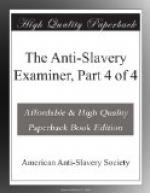But are we, in maintaining the principle of self-government, to overlook the unripe, or neglected, or broken powers of any of our fellow-men with whom we may be connected?—or the strong passions, vicious propensities, or criminal pursuits of others? Certainly not. But in providing for their welfare, we are to exert influences and impose restraints suited to their character. In wielding those prerogatives which the social of our nature authorizes us to employ for their benefit, we are to regard them as they are in truth, not things, not cattle, not articles of merchandize, but men, our fellow-men—reflecting, from however battered and broken a surface, reflecting with us the image of a common Father. And the great principle of self-government is to be the basis, to which the whole structure of discipline under which they may be placed, should be adapted. From the nursery and village school on to the work-house and state-prison, this principle is ever and in all things to be before the eyes, present in the thoughts, warm on the heart. Otherwise, God is insulted, while his image is despised and abused. Yes, indeed; we remember, that in carrying out the principle of self-government, multiplied embarrassments and obstructions grow out of wickedness on the one hand and passion on the other. Such difficulties and obstacles we are far enough from overlooking. But where are they to be found? Are imbecility and wickedness, bad hearts and bad heads, confined to the bottom of society? Alas, the weakest of the weak, and the desperately wicked, often occupy the high places of the earth, reducing every thing within their reach to subserviency to the foulest purposes. Nay, the very power they have usurped, has often been the chief instrument of turning their heads, inflaming their passions, corrupting their hearts. All the world knows, that the possession of arbitrary power has a strong tendency to make men shamelessly wicked and insufferably mischievous. And this, whether the vassals over whom they domineer, be few or many. If you cannot trust man with himself, will you put his fellows under his control?—and flee from the inconveniences incident to self-government, to the horrors of despotism?
“THOU THAT PREACHEST A MAN SHOULD NOT STEAL, DOST THOU STEAL.”
Is the slaveholder, the most absolute and shameless of all despots, to be entrusted with the discipline of the injured men who he himself has reduced to cattle?—with the discipline with which they are to be prepared to wield the powers and enjoy the privileges of freemen? Alas, of such discipline as he can furnish, in the relation of owner to property, they have had enough. From this sprang the very ignorance and vice, which in the view of many, lie in the way of their immediate enfranchisement. He it is, who has darkened their eyes and crippled their powers. And are they to look to him for illumination and renewed vigor!—and expect “grapes from thorns and figs from thistles!” Heaven forbid!




